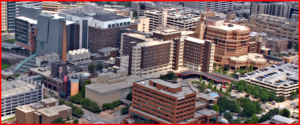Post Graduate Year One (PGY1) Pharmacy Residency

Program Code: 44200
National Matching Service Code: 180213
Start date: Mid-June, exact date to be communicated post-match
Number of positions: 8
The following outline represents general program design and requirements for the ASHP-accredited PGY1 Pharmacy Residency at the University of Cincinnati Medical Center. The program includes a variety of direct and non-direct patient care, research, and teaching opportunities and will be tailored to meet the needs of an individual resident based on the resident’s customized development plan.
Program requirements
Entrance into the PGY1 Pharmacy Residency requires the following:
- Doctor of Pharmacy degree from an ACPE – accredited College of Pharmacy
- Pharmacist licensure in the state of Ohio
- Ohio pharmacy intern license for orientation activities, if the resident does not anticipate having an active Ohio Pharmacist License by mid-June
The PGY1 Residency Certificate will be awarded upon successful completion of all established program requirements, including achievement of ASHP Required Competency Areas, Goals, and Objectives for PGY1 Pharmacy Practice Residency.
Clinical learning experiences
All experiences are one calendar month in duration, unless otherwise noted
Required
- Orientation (6 weeks)
- Critical Care
- Drug Policy Development
- General Surgery
- Internal Medicine
- Pharmacy Practice Management
- Research Project (focused month)
Elective
- Addiction Sciences
- Ambulatory Care
- Cardiology
- Critical Care Anesthesia Team
- Emergency Medicine
- Infectious Disease
- Inpatient BMT/Malignant Heme
- Internal Medicine Subspecialty
- Medical Step Down
- Medication Access Services
- Neonatal ICU
- Neuroscience
- Neuroscience ICU
- Orthopedic Surgery
- Outpatient BMT/Malignant Heme
- Outpatient Solid Tumor Oncology Clinic
- Psychiatry
- Solid Organ Transplant
- Specialty Pharmacy
- Trauma Surgery
Longitudinal
- Ambulatory Care Clinic (one half day per week for 6 months); day of the week and portion of the year varies for each resident
- Committee Participation (1-2 hours/month depending on committee, beginning in August)
- Pharmacy Practice Service (a hybrid of every other weekend and every third weekend beginning in August)
- Research (longitudinal completion of Research Project – dedicated Research Month in December)
Frequently Asked Questions:
Q: How competitive is the residency application process?
A: We typically receive between 100-125 applications for 8 residency positions.
Q: How do you decide which applicants receive an interview invitation?
A: Members of the Residency Advisory Committee review all applicants’ PhORCAS submissions using an objective screening tool. All scores are calculated, and applicants with the highest scores are offered on-site interviews.
Q: Does your PGY1 Pharmacy Residency Program participate in Personal Placement Service (PPS) at the Midyear Clinical Meeting?
A: The PGY1 program does not participate in PPS, but PGY2 programs with open positions do participate.
Q: Does your program offer a Teaching Certificate Program?
A: Yes, a Teaching Certificate Program is offered through the University of Cincinnati James L. Winkle College of Pharmacy. Please see the “Teaching Certificate Program/Education Opportunities” section above for more details.
Q: What does a typical interview day look like for your program/what can I expect during my interview with your program?
A: The interview day consists of a full day with interview sessions with preceptors, pharmacy administrators, and current residents as well as the presentation of a patient case (no preparation required). The residency candidate will also be given a tour of our facility and have the opportunity to sit in on a resident educational presentation to get a feel for the people and culture of our organization.
Q: What are the staffing requirements for a PGY1 resident at your organization?
A: PGY1 residents work a hybrid schedule of every other weekend and every third weekend beginning in August. A majority of the weekends are spent in our Central Pharmacy learning about operations, but every 3-4 weekends, the resident will assist our weekend clinical pharmacy team with clinical coverage.
Q: How flexible is your program with schedule changes throughout the course of the residency year?
A: We pride ourselves on being extremely flexible. We understand that PGY1 residents’ interests and desires change with time and exposure to new experiences and work to ensure that each resident is afforded all opportunities they desire.
Q: What do residents typically do after they complete a PGY1 at your hospital?
A: A majority of our residency graduates go on to complete a PGY2 residency or fellowship. Some of our residency graduates have also gone on to accept clinical pharmacy specialist or clinical staff pharmacist positions post-residency.
